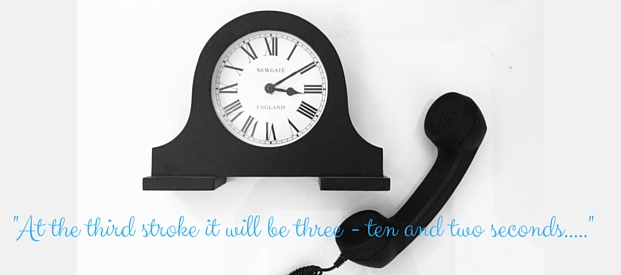The Speaking Clock, Eighty Years on
To celebrate the 80th birthday of the Speaking Clock, we take a look back at how this time service has developed over the years and hear about a new exhibition which tells the story of the clock and its voices.
“At the third stroke it will be seven – thirty six – and two seconds.” On 24 July 1936, Ethel Cain’s voice was first heard telling the time for a brand new telephone service: the Speaking Clock. Eighty years on, the service is still highly valued and is especially busy on four notable days each year.
Before the Speaking Clock
Eighty years ago, before Ethel won the competition to be the voice of the Speaking Clock and won herself a guinea (£10.50) for her perfectly enunciated words, most people relied on mechanical clocks. But without regular maintenance and cleaning, these could become inaccurate, and so it was the Post Office clock that people relied on for accuracy, and many would telephone the operator to ask the time.
In the very old days, when time was calculated by the old solar measurements, different parts of the UK operated on different times and the mail coaches set their watches by the Post Office clock and took the official city time to more remote areas.
Ethel records the clock
Ethel Cain recorded the voice of the Speaking Clock in ‘bites’ or ‘jerks’. She described the process: “The actual recording wasn’t as strenuous as most people seem to think. The real work was done by the engineers of the Post Office. The way I recorded it was in jerks as it were. I said ‘At the Third Stroke’ and then I counted from One, Two, Three Four, for the hours…”
After Ethel
Ethel remained the voice of the Speaking Clock for 27 years until she was replaced in 1963 by the voice of Pat Simmons and in 1985 by Brian Cobby. With each change of voice, the clock itself was updated, first with a transistor version and then with digital. Dial 123 today and you’ll hear the friendly voice of Sara Mendes da Costa who recorded the words in 2007 after winning a competition for Children in Need and being chosen out of more than 18,500 applicants.
And what about TIM? People ‘of a certain age’ remember telephoning TIM: not a real person, but the first three letters of ‘time’, and the letters dialled on an old-style telephone which corresponded to the digits 846, the number of the Speaking Clock.
Celebrity voices
In recent years the Speaking Clock has been voiced by an array of guest celebrities to raise money for charity. Lenny Henry was the first to take over the clock, using a different character each day for two weeks, raising an impressive £200,000 for Comic Relief. Twelve-year-old Alicia Rowland won a competition in aid of Childline and became the only child to read the time on the Speaking Clock. Other celebrities followed, most recently, Sir Ian McKellen for Comic Relief in 2015, and Jo Brand, who spoke the iconic words in aid of Sport Relief in 2016.
In the days before recording the Speaking Clock, Jo completed a week-long charity walk from Hull to Liverpool. She said, “Recording the voice for the BT Speaking Clock is a similar process mentally to walking 150 miles – it was long, boring and I had to eat a lot of chocolate bars to get through it. Luckily for callers I’m a professional at hiding this so you won’t hear any rustling of wrappers and you’ll be helping to support a good cause every time you dial 123.”
Eighty years on
So, eighty years on from the day the Speaking Clock first began to tell us the time, now that accurate time checks are easily available thanks to the internet, radio and television, do we still need the service?
The answer is most definitely ‘yes’: many people still make good use of the Speaking Clock, especially on four dates each year when the correct time is of extra importance.
On New Year’s Eve we use the Speaking Clock to synchronise watches to make sure the New Year is welcomed in at exactly the right moment. On the two days each year when the clocks go back or forwards, we call to make sure we have the correct time. And on Remembrance Day, we check the time with the Speaking Clock so that throughout the UK everyone begins the two-minute silence at exactly 11am.
You can discover more about Ethel, Pat and TIM in a special exhibition celebrating the 80th birthday of the Speaking Clock on 18-19 June at Upton Hall, near Newark, Nottinghamshire. This beautiful historic house is the HQ of the British Horological Institute and the place to see an amazing collection of historic clocks and watches.
And don’t forget, that calendars are the perfect method for making sure you are up to date as well as knowing the exact time of day!










